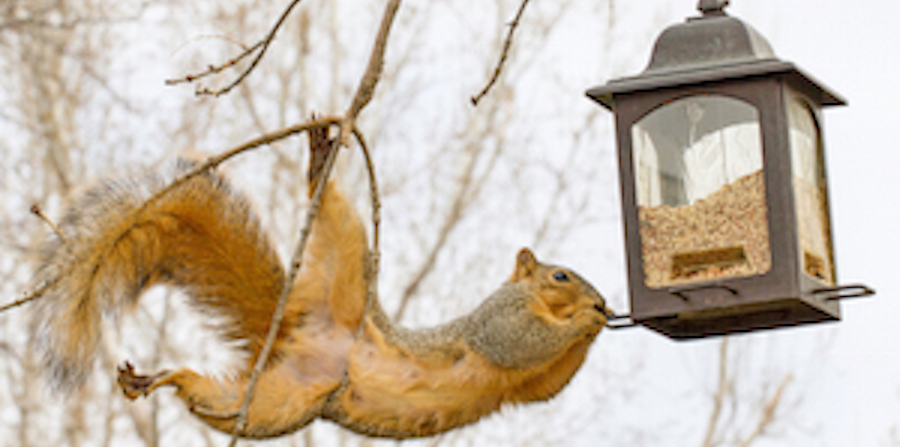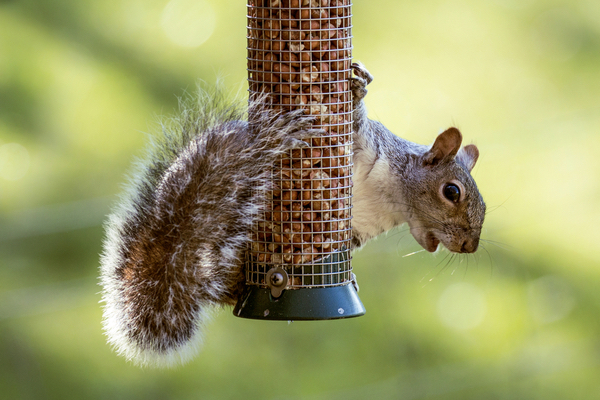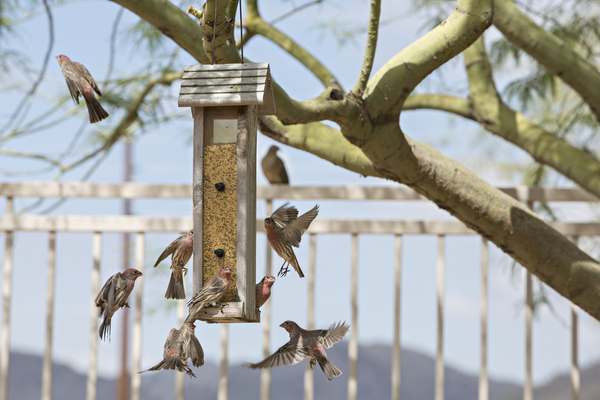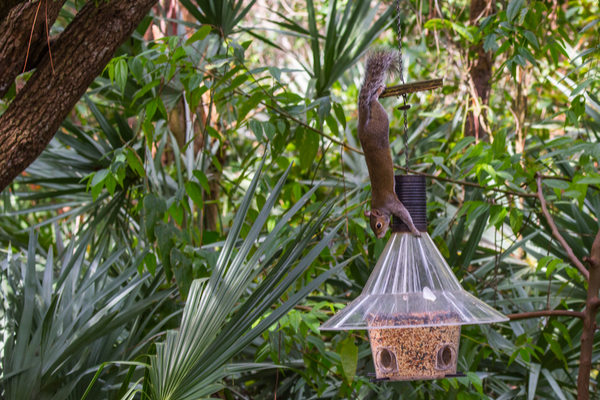Squirrels are always rather mercenary when it comes to getting food, but fall is when they become relentless. Nobody knows this better than the innocent bird lover. You’re thinking about taking your feeder down for the year, but a few feathered friends still rely on it. So, your bird feeder remains, perched against the fall like a bird seed-based symbol of defiance. Then… the squirrels come.
These rodential rascals stop at nothing to deprive your birds of the meal that’s meant for them. They’ll hang upside down, perform death-defying acrobatics, and get shockingly aggressive, all in the name of a little seed. They seem unstoppable. They’re not. You just need to get even more creative than they are. Here are four ideas to help you get started.
Baffle Them
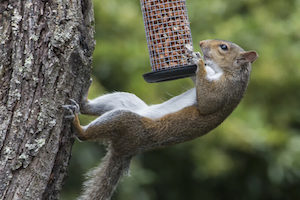 You can find a bowl-like contraption called a “squirrel baffle” for sale at most hardware stores. They’re designed to, well, baffle squirrels. Baffles are made of plastic or metal and hang near the bird feeder. If your feeder hangs from a tree, then the baffle attaches above the feeder. If your feeder rests on a pole sticking out of the ground, then the baffle goes beneath the feeder on the pole.
You can find a bowl-like contraption called a “squirrel baffle” for sale at most hardware stores. They’re designed to, well, baffle squirrels. Baffles are made of plastic or metal and hang near the bird feeder. If your feeder hangs from a tree, then the baffle attaches above the feeder. If your feeder rests on a pole sticking out of the ground, then the baffle goes beneath the feeder on the pole.
Place the “bowl” upside down, so that the concave opening points down. When squirrels try to climb on the baffle, they won’t be able to find purchase. Instead of getting at your feeder, they’ll slide off the plastic slope and fall off. Don’t worry–squirrels are master acrobats, so a little fall won’t hurt them. It is pretty funny to watch, though. Baffles are cheap and relatively easy to make. Make sure your homemade baffle is wide enough that squirrels can’t stretch around it. If they can, you know they will…
Diversion
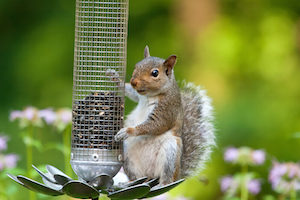 Based on the gusto they exhibit in the act, it’s easy to assume squirrels enjoy their feats of robbery. Believe it or not, however, that’s not the case. Squirrels go to great lengths to get at your feeder for one reason: they’re opportunists. When temperatures start to drop, squirrels get desperate to fatten up for winter. They need the food, and they’ve got the skills, so why not stage their high-flying heists on your feeder?
Based on the gusto they exhibit in the act, it’s easy to assume squirrels enjoy their feats of robbery. Believe it or not, however, that’s not the case. Squirrels go to great lengths to get at your feeder for one reason: they’re opportunists. When temperatures start to drop, squirrels get desperate to fatten up for winter. They need the food, and they’ve got the skills, so why not stage their high-flying heists on your feeder?
But what if they didn’t need to? Squirrels are all about the path of least resistance. If you were to, say, distract them with a more accessible food source, they’d leave your feeder alone. We’re not saying this idea doesn’t have drawbacks. You’d need a lot of food. Squirrels are nigh-insatiable this time of year. Plus, you’d invite more squirrels to your yard than ever. And you’d be feeding the enemy. When it comes to keeping squirrels away from a vulnerable feeder, however, a diversion may well be your best option. Everybody eats, everybody wins.
Spice It Up!
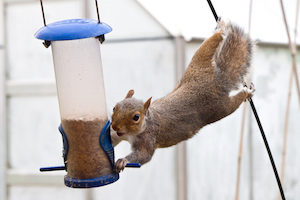 Alright, so you don’t want to deal with any more squirrels than you have to. And you don’t want to feed those glorified bandits anyway. Fair enough. What if you could make the food you’re leaving for birds into something only birds would want to eat? You wouldn’t have to set out more food or even go to great lengths to squirrel-proof your feeder!
Alright, so you don’t want to deal with any more squirrels than you have to. And you don’t want to feed those glorified bandits anyway. Fair enough. What if you could make the food you’re leaving for birds into something only birds would want to eat? You wouldn’t have to set out more food or even go to great lengths to squirrel-proof your feeder!
Well, did you know that birds don’t mind spicy seeds? They can’t taste the difference. Guess what can? Sprinkle some cayenne pepper or a similar spice onto your birdseed before you put it out. Birds will eat the seed just fine, but squirrels will smell the heat and stay well clear. You’ll have to re-apply the spice frequently, however, or it’ll wash off or blow away. Squirrels will notice the spice is gone as quickly as they smelled it in the first place, and then you’ll be back to square one. Some stores also sell bird seed that starts spicy, so you don’t have to add the spice yourself.
Suspension
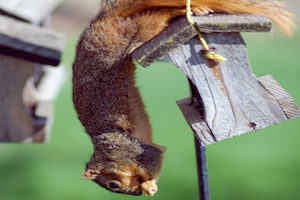 The squirrels around your house can leap up to 10 feet horizontally, but they can’t fly. If you could figure out a way to suspend your feeder just right, you could make it a birds-only zone. The easiest way to manage this gravity-defying trick would be to string up a wire between two trees.
The squirrels around your house can leap up to 10 feet horizontally, but they can’t fly. If you could figure out a way to suspend your feeder just right, you could make it a birds-only zone. The easiest way to manage this gravity-defying trick would be to string up a wire between two trees.
First, find two mature trees that are at least 10 feet away from each other. Run the wire between the trees and pull it taut. Then, run some “spinners” along the wire to prevent particularly determined tightrope walkers. Spinners can be plastic soda bottles, yarn spools, or anything else that rolls. Squirrels won’t be able to walk across the spinner without rolling off the wire and onto the ground. Finally, hang your bird feeder in the dead center of the wire, far from either tree. Voila! You have a floating bird feeder. Terrestrial mammals need not apply. Just make sure the bird feeder is high enough off the ground, too. All this work won’t matter if your squirrels can just leap up and knock seed down whenever they want.
Look, all of these ideas may make it sound like we hate squirrels. We don’t! We actually find their determination and resourcefulness charming. Plus, they have those bushy little tails. The fact of the matter is, though, squirrels don’t need your birdseed. They’ll be just fine on their own. They got this far, after all.
Unfortunately, squirrels aren’t the only wildlife you’ll have be on the look-out for this fall–and most of the rest of it isn’t nearly as charming. If you have a pest problem in your home, whether it’s rodent or insect-based, give Griffin a call today. We’ll set you up for winter right, so you have nothing to worry about. Happy bird watching!

